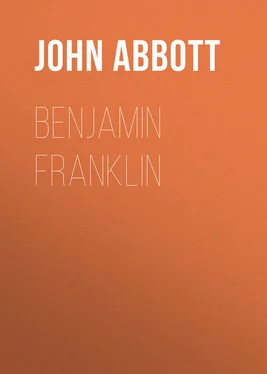John Abbott - Benjamin Franklin
Здесь есть возможность читать онлайн «John Abbott - Benjamin Franklin» — ознакомительный отрывок электронной книги совершенно бесплатно, а после прочтения отрывка купить полную версию. В некоторых случаях можно слушать аудио, скачать через торрент в формате fb2 и присутствует краткое содержание. Жанр: foreign_antique, foreign_prose, на английском языке. Описание произведения, (предисловие) а так же отзывы посетителей доступны на портале библиотеки ЛибКат.
- Название:Benjamin Franklin
- Автор:
- Жанр:
- Год:неизвестен
- ISBN:нет данных
- Рейтинг книги:3 / 5. Голосов: 1
-
Избранное:Добавить в избранное
- Отзывы:
-
Ваша оценка:
- 60
- 1
- 2
- 3
- 4
- 5
Benjamin Franklin: краткое содержание, описание и аннотация
Предлагаем к чтению аннотацию, описание, краткое содержание или предисловие (зависит от того, что написал сам автор книги «Benjamin Franklin»). Если вы не нашли необходимую информацию о книге — напишите в комментариях, мы постараемся отыскать её.
Benjamin Franklin — читать онлайн ознакомительный отрывок
Ниже представлен текст книги, разбитый по страницам. Система сохранения места последней прочитанной страницы, позволяет с удобством читать онлайн бесплатно книгу «Benjamin Franklin», без необходимости каждый раз заново искать на чём Вы остановились. Поставьте закладку, и сможете в любой момент перейти на страницу, на которой закончили чтение.
Интервал:
Закладка:
“This was another of the great errors of my life; which I could wish to correct were I to live it over again.”
For nearly a year, Franklin thus continued in the employment of Mr. Palmer, receiving good wages and spending them freely. A very highly esteemed clergyman of the Church of England named Wollaston, had written a book entitled, “The Religion of Nature Delineated.” It was a work which obtained much celebrity in those days and was published by Mr. Palmer. It was of the general character of Butler’s Analogy, and was intended to prove that the morality enjoined by Jesus Christ, was founded in the very nature of man; and that the principles of that morality were immutable, even though deists should succeed in destroying the public faith in the divine authority of Christianity. It was eminently an amiable book, written with great charity and candor, and without any dogmatic assumptions.
It chanced to fall to Franklin to set up the type. As was customary with him, he made himself thoroughly acquainted with the treatise of which he thus became the compositor. His mind was in such a state in reference to the claims of that Christianity which certainly did not commend the mode of life he was living, that it excited not only antagonistic but even angry emotions. So thoroughly were his feelings aroused, that he wrote and published a pamphlet of thirty-two pages, in refutation of the theory of Mr. Wollaston.
Franklin dedicated his work, which was entitled “A dissertation on Liberty and Necessity, Pleasure and Pain,” to James Ralph. Fortunately, the treatise has descended to us unmutilated. He commences with the observation:
“I have here given you my present thoughts upon the general state of things in the universe.”
The production was certainly a very able one to come from the pen of a young printer of but nineteen years. Mr. Palmer, while recognizing its ability, pronounced its principles to be atrocious and demoralizing. The production of such a work, literary, philosophical and religious, by probably the youngest companion of the journeymen printers, caused them all to open their eyes with astonishment, and he was regarded at once as a great man among them. 7 7 In this extraordinary document our young deist writes, “There is said to be a first mover, who is called God, who is all wise, all good, all powerful. If he is all good, whatsoever he doeth must be good. If he is all wise, whatever he doeth must be wise. That there are things to which we give the name of Evil , is not to be denied – such as theft, murder, etc. But these are not in reality evils. To suppose anything to exist or to be done contrary to the will of the Almighty is to suppose him not Almighty. There is nothing done but God either does or permits. Though a creature may do many actions, which, by his fellow creatures, will be named evil, yet he can not act what will be in itself displeasing to God. “We will sum up the argument thus, When the Creator first designed the universe, either it was his will that all should exist and be in the manner they are at this time, or it was his will that they should be otherwise. To say it was His will things should be otherwise, is to say that somewhat hath contradicted His will; which is impossible. Therefore we must allow that all things exist now in a manner agreeable to His will; and, in consequence of that, all are equally good and therefore equally esteemed by Him. No condition of life or being is better or preferable to another.” This whole treatise may be found in the appendix to the first volume of Parton’s Life of Franklin.
The deists of London, who had united in a club of merry free-thinkers, holding their meetings at an ale-house, sought out Franklin and drew him into their convivial gatherings. These men had no common principle of belief; they were united only in the negative principle of unbelief in the Christian religion. Ralph had formed a connection with a young milliner, by whom, through his many fascinations, he was mainly supported.
Franklin, with his increasing expenditures, was now disposed to shake off Ralph, as he needed all his money for his own convivial enjoyments. Ralph went into the country and opened a school, where he utterly failed. The unhappy milliner, ruined in character, and with a little child, wrote to Franklin imploring aid. Her letters touched his kindly heart. He could never see sorrow without wishing to relieve it. He furnished her with money, in small sums, to the amount of one hundred and thirty dollars; and worst of all, we regret to say that he commenced treating her with such familiarity, that she, still faithful to Ralph, repulsed him indignantly. 8 8 Franklin writes in his autobiography, “I grew fond of her company, and being at that time under no religious restraint, and taking advantage of my importance to her, I attempted to take some liberties with her, another erratum , which she repulsed with a proper degree of resentment. She wrote to Ralph and acquainted him with my conduct. This occasioned a breach between us; and when he returned to London, he let me know he considered all the obligations he had been under to me as annulled.” – Works of Franklin, Vol. i, p. 59.
Franklin does not conceal these foibles , as he regarded them, these sins as Christianity pronounces them. He declares this simply to have been another of the great errors of his youth. She informed Ralph of his conduct. He was enraged, broke off all further communication with Franklin, and thirty-five years passed away before they met again. Ralph, goaded to desperation, gained a wretched living in various literary adventures; writing for any body, on any side, and for any price. Indeed he eventually gained quite an ephemeral reputation. He could express himself with vivacity, and several quite prominent politicians sought the aid of his pen.
Franklin, thus relieved from the support of Ralph, soon after entered a more extensive printing house, at Lincoln’s Inn Fields. Though he was exceedingly fond of a sparkling glass of wine in his convivial hours, he was too much of a philosopher to stupefy his brain in guzzling beer. His habitual daily beverage was cold water.
“My companion at the press,” he wrote, “drank every day a pint before breakfast, a pint at breakfast with his bread and cheese, a pint between breakfast and dinner, a pint at dinner, and another when he had done his day’s work. I thought it a detestable custom. But it was necessary, he supposed, to drink strong beer that he might be strong to labor. I endeavored to convince him that the bodily strength afforded by beer could only be in proportion to the grain or the barley dissolved in the water of which it was made; that there was more flour in a pennyworth of bread, and, therefore, if he could eat that with a pint of water, it would give him more strength than a quart of beer. He drank on, however, and had four or five shillings to pay, out of his wages, every Saturday night, for that vile liquor; an expense I was free from; and thus these poor devils keep themselves always under.”
Again Franklin wrote in characteristic phrase, in reference to the influence of his example over some of his companions,
“From my example, a great many of them left their muddling breakfast of bread, beer and cheese, finding they could, with me, be supplied from a neighboring house, with a large porringer of hot water gruel, sprinkled with pepper, crumbled with bread and a bit of butter in it, for the price of a pint of beer, – three half-pence. This was a more comfortable, as well as a cheaper breakfast, and kept their heads clearer. Those who continued sotting with their beer all day, were often, by not paying, out of credit at the ale-house; and used to make interest with me to get beer; their light as they phrased it being out. I watched the pay table on Saturday night, and collected what I stood engaged for them, having to pay sometimes on their account.”
Читать дальшеИнтервал:
Закладка:
Похожие книги на «Benjamin Franklin»
Представляем Вашему вниманию похожие книги на «Benjamin Franklin» списком для выбора. Мы отобрали схожую по названию и смыслу литературу в надежде предоставить читателям больше вариантов отыскать новые, интересные, ещё непрочитанные произведения.
Обсуждение, отзывы о книге «Benjamin Franklin» и просто собственные мнения читателей. Оставьте ваши комментарии, напишите, что Вы думаете о произведении, его смысле или главных героях. Укажите что конкретно понравилось, а что нет, и почему Вы так считаете.









![Benjamin Franklin - Memoirs of Benjamin Franklin; Written by Himself. [Vol. 2 of 2]](/books/747975/benjamin-franklin-memoirs-of-benjamin-franklin-wr-thumb.webp)
![Benjamin Franklin - Memoirs of Benjamin Franklin; Written by Himself. [Vol. 1 of 2]](/books/748053/benjamin-franklin-memoirs-of-benjamin-franklin-wr-thumb.webp)

